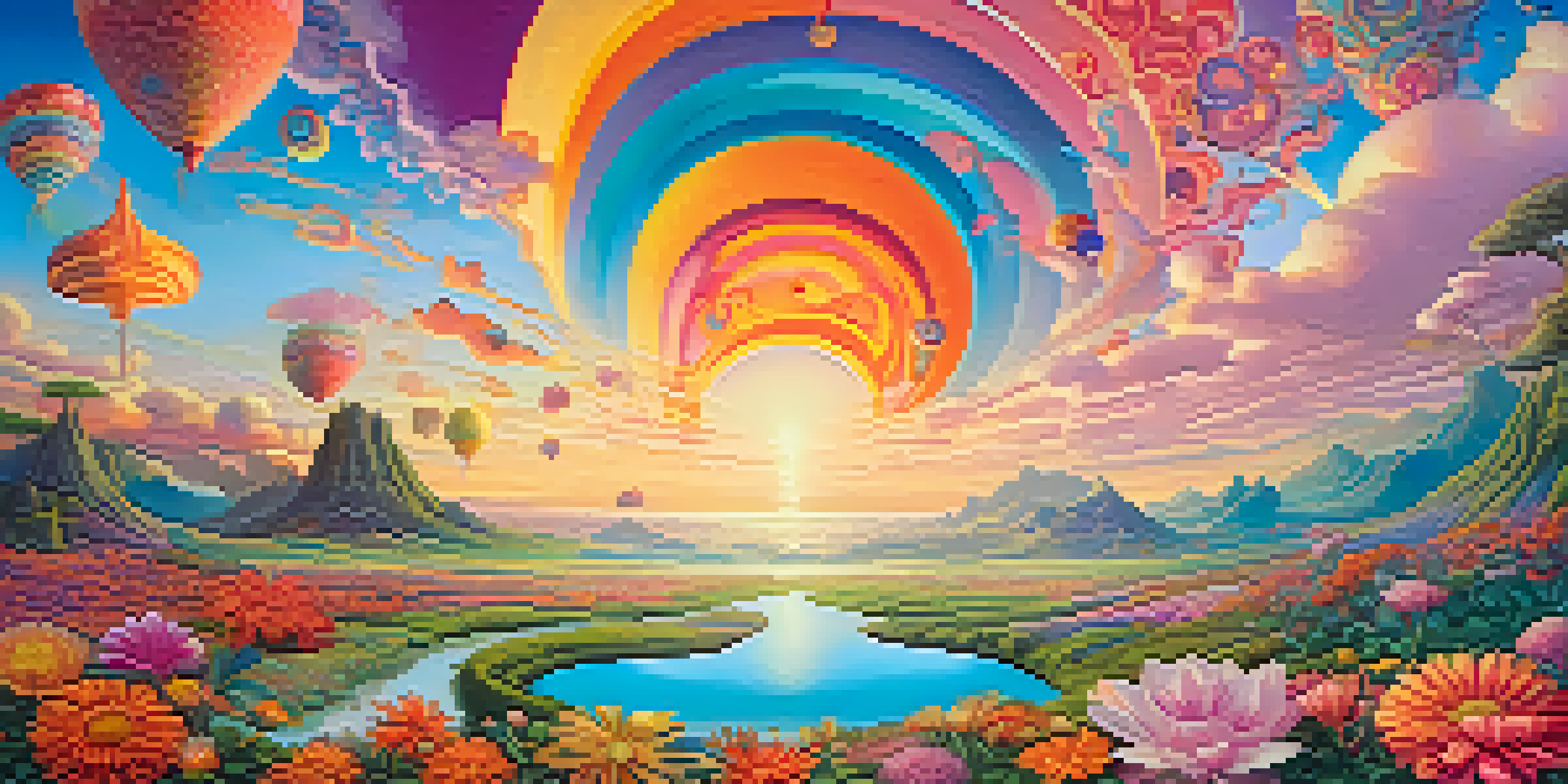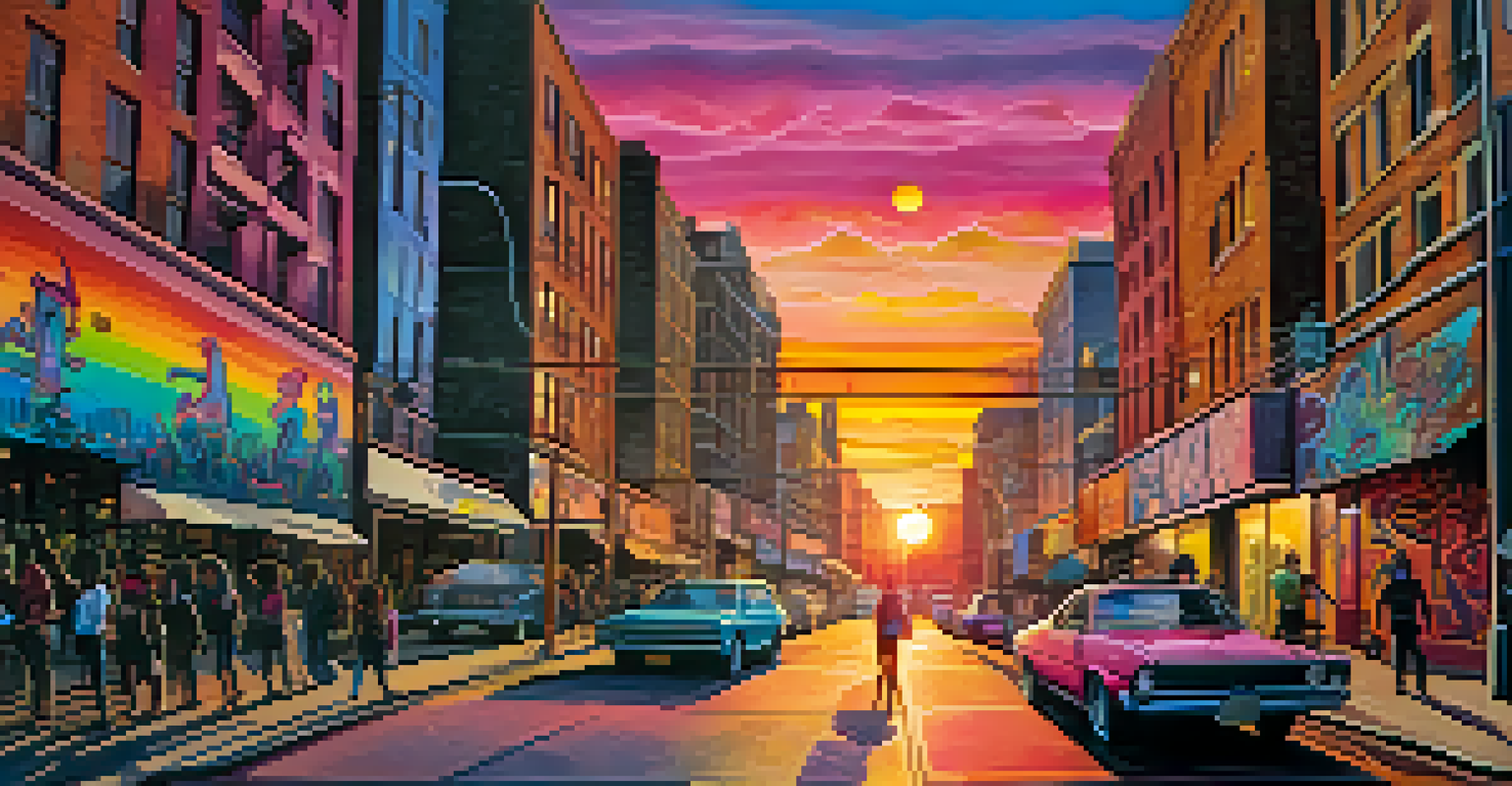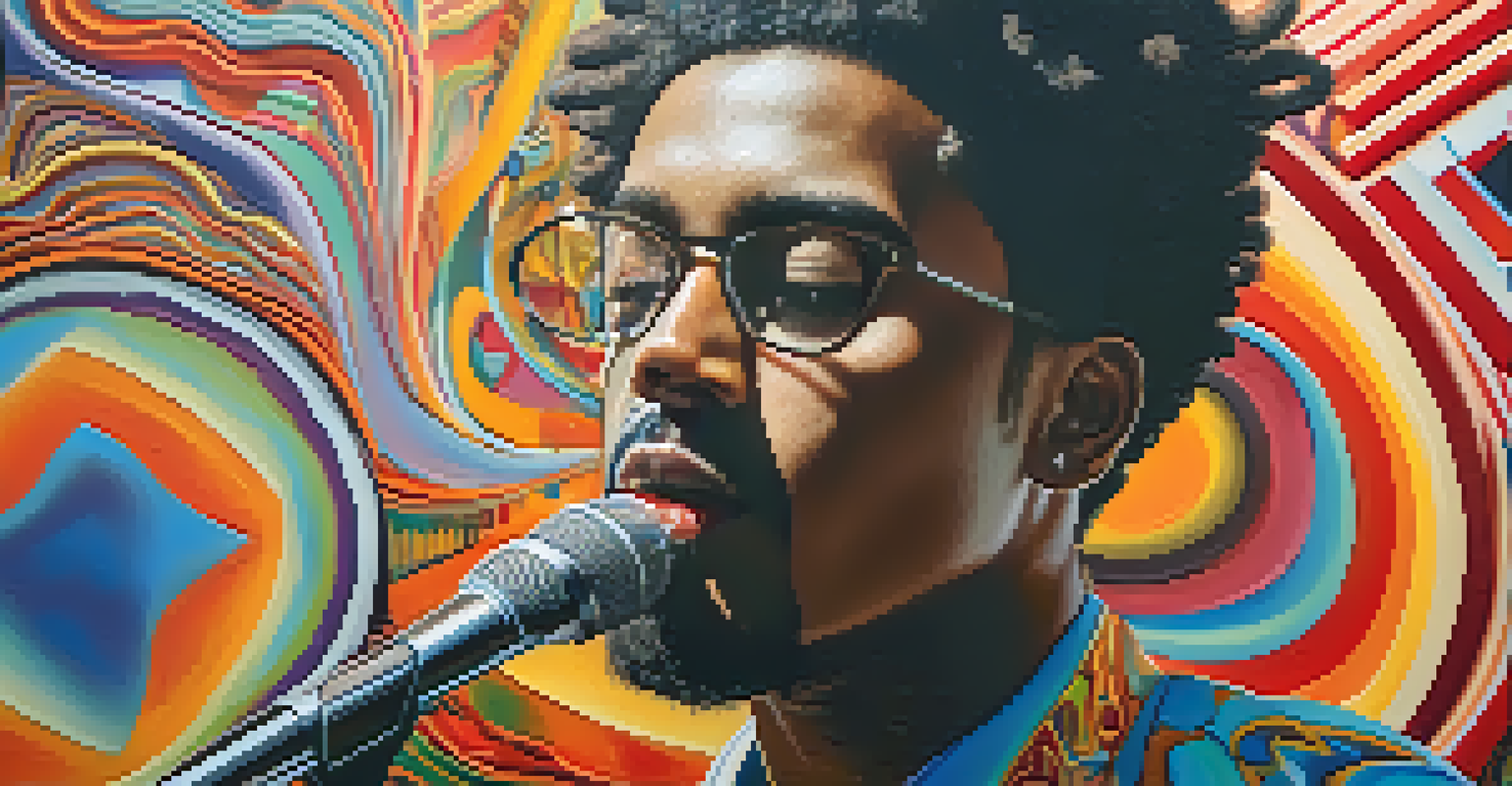Psychedelic Hip-Hop: Hallucinogens in Modern Rap Lyrics

The Rise of Psychedelic Hip-Hop in Contemporary Music
Psychedelic hip-hop is a fascinating genre that blends traditional rap with influences from psychedelic culture. This fusion creates a soundscape that feels both innovative and reflective of the complexities of modern life. Artists are increasingly exploring themes related to consciousness, perception, and self-discovery, which resonate with listeners seeking deeper connections.
Psychedelics can be a path to deeper understanding and creativity, enhancing the way we experience art and music.
The genre gained momentum in the late 2010s, with artists like A$AP Rocky and Travis Scott integrating psychedelic elements into their music. Their use of experimental beats and surreal lyricism has pushed the boundaries of hip-hop, making it a space for creative exploration. This shift reflects a broader cultural acceptance of psychedelic experiences and their potential for personal growth.
Listeners are drawn to the vibrant imagery and introspective themes in psychedelic hip-hop lyrics. The genre invites fans to consider their own experiences with reality and perception, making the music relatable on a personal level. As more artists embrace this style, we can expect to see even more innovative approaches to storytelling in rap.
Hallucinogens and Their Cultural Significance
Hallucinogens have influenced various art forms for decades, and hip-hop is no exception. These substances, such as LSD and psilocybin mushrooms, have been associated with enhanced creativity and altered states of consciousness. By integrating these themes into their lyrics, artists are tapping into a long-standing tradition of exploring the mind's boundaries.

Cultural references to hallucinogens in rap can often serve as metaphors for larger existential questions. For example, artists may use psychedelic experiences to discuss themes of identity, freedom, or the search for truth. This approach not only enriches their lyrical content but also resonates with listeners who may be navigating similar journeys.
Psychedelic Hip-Hop's Cultural Impact
The genre blends traditional rap with psychedelic influences, exploring themes of consciousness and self-discovery.
Moreover, the stigma surrounding psychedelic use is slowly diminishing, allowing artists to speak more openly about their experiences. As society becomes more accepting of these substances, we can anticipate a continued evolution in how they are represented in music. This shift opens up conversations about mental health, exploration, and self-discovery.
Influence of Psychedelic Imagery in Lyrics
Psychedelic hip-hop often features vivid imagery that captures the essence of altered states. Artists paint pictures with words, using metaphors and similes that evoke sensations and emotions associated with hallucinogenic experiences. This style not only enhances the listening experience but also allows fans to visualize the narratives being told.
Music is the shorthand of emotion, and psychedelic hip-hop takes you on a journey through the depths of the mind.
For instance, songs may describe colorful landscapes, surreal encounters, or mind-bending transformations that mirror the effects of psychedelics. This creative approach invites listeners to engage their imaginations and explore the depths of their own perceptions. It’s a journey that transcends traditional storytelling, taking fans on a ride through the mind's eye.
Additionally, the use of psychedelic imagery can serve as a bridge between the artist's personal experiences and the audience's understanding. When listeners connect with these visuals, they can reflect on their own lives and experiences, fostering a sense of community and shared exploration. This connection is what makes psychedelic hip-hop so compelling.
Notable Artists Who Embrace Psychedelic Themes
Several artists have made significant contributions to the psychedelic hip-hop genre, each bringing their unique flair. For instance, Kid Cudi is known for his introspective lyrics that often delve into themes of mental health and existential exploration. His work resonates with fans who appreciate the intersection of vulnerability and creativity.
Another prominent figure is Lil Uzi Vert, whose music often incorporates references to psychedelic experiences. His energetic beats paired with imaginative lyrics create an atmosphere that encourages listeners to embrace the unconventional. This blend of styles has garnered a loyal following and solidified his place in the genre.
Notable Artists Pushing Boundaries
Artists like Kid Cudi and Lil Uzi Vert are integrating psychedelic themes, creating innovative music that resonates with fans.
Additionally, Flying Lotus, a producer and rapper, seamlessly melds electronic music with hip-hop, creating a sound that feels both experimental and familiar. His ability to weave complex narratives through his lyrics and production showcases the potential of psychedelic hip-hop to push artistic boundaries. These artists exemplify how embracing psychedelic themes can lead to groundbreaking music.
Lyrical Analysis of Psychedelic References
Analyzing lyrics from psychedelic hip-hop reveals layers of meaning that may not be immediately apparent. Artists often use abstract language to convey their experiences, requiring listeners to engage critically with the content. This depth adds richness to the music, prompting discussions about interpretation and personal resonance.
For example, in a song where an artist describes a journey through a vibrant landscape, the imagery may symbolize personal growth or a quest for understanding. By deconstructing these lyrics, fans can uncover the artist's intent and relate it to their own lives. This analytical approach enhances the overall appreciation of the music.
Moreover, the use of wordplay and rhythm in these lyrics contributes to their psychedelic nature. The way words flow and interact can mimic the sensations associated with hallucinogenic experiences, creating an immersive auditory experience. As listeners dive deeper into the analysis, they discover a world of creativity that challenges conventional thinking.
The Role of Production in Psychedelic Hip-Hop
Production plays a crucial role in shaping the sound of psychedelic hip-hop, with many artists collaborating with innovative producers. The use of experimental beats, layered sounds, and unconventional samples creates a sonic landscape that mirrors the themes explored in the lyrics. This musical experimentation enhances the overall experience for listeners.
Producers like Flying Lotus and Thundercat are known for their ability to blend genres, creating a sound that feels both fresh and nostalgic. Their work emphasizes the relationship between sound and perception, inviting listeners to lose themselves in the music. This synergy between lyrics and production is what sets psychedelic hip-hop apart from other genres.
Future of Psychedelic Hip-Hop
As societal acceptance of psychedelics grows, the genre is expected to evolve, promoting mental health and personal exploration.
Additionally, the incorporation of ambient sounds and electronic elements further enhances the psychedelic experience. These layers add depth and complexity, allowing the music to evoke emotions and sensations that resonate with listeners. As production techniques continue to evolve, we can expect psychedelic hip-hop to push the boundaries of creativity even further.
The Future of Psychedelic Hip-Hop
As psychedelic hip-hop continues to gain traction, its future looks promising. Artists are exploring new themes and sounds, pushing the envelope of what hip-hop can be. This genre's ability to blend various influences makes it a dynamic space for creative expression.
With the increasing acceptance of psychedelics in society, we may see more artists openly discussing their experiences and incorporating them into their music. This openness can foster a culture of exploration and understanding, encouraging listeners to reflect on their own journeys. As these conversations unfold, psychedelic hip-hop could become a powerful platform for promoting mental health and self-discovery.

Ultimately, the evolution of psychedelic hip-hop will likely mirror changes in societal attitudes toward creativity and consciousness. As artists continue to innovate and challenge norms, this genre has the potential to inspire a new generation of musicians and fans alike. The future is bright for psychedelic hip-hop, and we can’t wait to see where it leads.